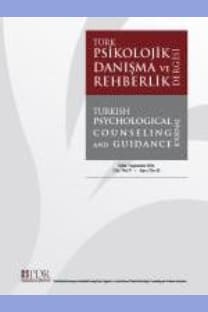Okullarda PDR Uygulamaları Dersine İlişkin Öğrenci Görüşlerinin İncelenmesi
PDR uygulama dersi, okul, PDR öğrencisi
Students’ Views on The Course of Counseling and Guidance Practice At Schools
___
- Council for Accreditation of Counseling and Related Programs. (1994). CACREP accreditation standards and procedures manual. Alexandria, VA: Author.
- Getz, H. G. (1999). Assessment of clinical supervisor competencies. Journal of Counseling and Development, 77, 491-497.
- Henderson, R. (1994). Supervision of school counselors. Greensboro, NC: ERIC Clearinghouse on Counseling and Student Services. (ERIC Document Reproduction Service No. ED372353).
- Nelson, M. D. & Johnson, P. (1999). School counselors as supervisers: An integrated approach to supervising school counseling interns. Counselor Education and Supervision, 39, 89-100.
- Nelson, K. W. & Jackson, S. A. (2003). Professional counselor identity development: A qualitative study of Hispanic student interns. Counselor Education & Supervision, 43, 2-14
- Özyürek, R., Çam, S. ve Atıcı, M. (2007). Psikolojik danışman uygulamalarının önerilen özellikleri. Kuram ve Uygulamada Eğitim Bilimleri, 7(1), 555-588. rehberlik
- Özyürek, R. (2009). Okullarda psikolojik danışma uygulamaları ve öğrencilere sağlanan süpervizyon olanakları: Ulusal bir tarama çalışması. Türk Psikolojik Danışma ve Rehberlik Dergisi, 4(832), 54-63.
- Perusse, R., Goodnough, G. E. & Noel, C. J. (2001). A national survey of school counselor preparation programs: Screening methods, faculty experiences, curricular content, and fieldwork requirements. Counselor Education & Supervision, 40, 252-262.
- Skovholt, T. M. & Ronnestad, M. H. (1992). Themes in therapist and development. Journal of Counseling and Development, 70, 505-515.
- Studer, J. R. (2005). Supervising school counselors in training: A guide for field supervisors. Professional School Counselor, 8(4), 353-359.
- Strauss, A. & Corbin, J. (1990). Basics of qualitative research: Grounded theory procedures and technique. London: Sage Publications.
- Sutton, J. M. & Page, B. J. (1994). Post-degree clinical supervision of school counselors. The School Counselor, 42(1), 32-39.
- Wood, C. & Dixon Rayle, A. (2006). A model of school counseling supervision: The goals, functions, roles, and systems model. Counselor Education and Supervision, 45, 253-266.
- Yıldırım, A. ve Şimşek, H. (2008). Sosyal bilimlerde nitel araştırma yöntemleri (7.bs.), Ankara: Seçkin Yayınevi.
- ISSN: 1302-1370
- Başlangıç: 1990
- Yayıncı: -
Çocuklar İçin Aile İlişkileri Ölçeği’nin Geliştirilmesi
Selen DEMİRTAŞ ZORBAZ, Fidan KORKUT OWEN
Okullarda PDR Uygulamaları Dersine İlişkin Öğrenci Görüşlerinin İncelenmesi
Psikolojik Danışman Adaylarının Başarı Yönelimlerinin Bazı Değişkenlere Göre Yordanması
Hatice ODACI, Çiğdem ÇELİK, Özkan ÇİKRIKCİ
Aile İçi Şiddete Maruz Kalan Kadınlarda Aile İçi Şiddetle Başa Çıkma Özyeterliği
Lise Son Sınıf Öğrencilerinin Sınav Kaygısını Yordayan Değişkenlerin İncelenmesi
Aldatmaya yönelik niyet ölçeği'nin Türkçe uyarlaması: Geçerlik ve güvenirlik çalışmaları
Esin TEZER, Ezgi DEMİRTAŞ TOPLU
Evlilik Doyumunu Yordayan İlişkisel ve Kişisel Değişkenler
Aldatmaya Yönelik Niyet Ölçeği’nin Türkçe Uyarlaması: Geçerlik ve Güvenirlik Çalışmaları
